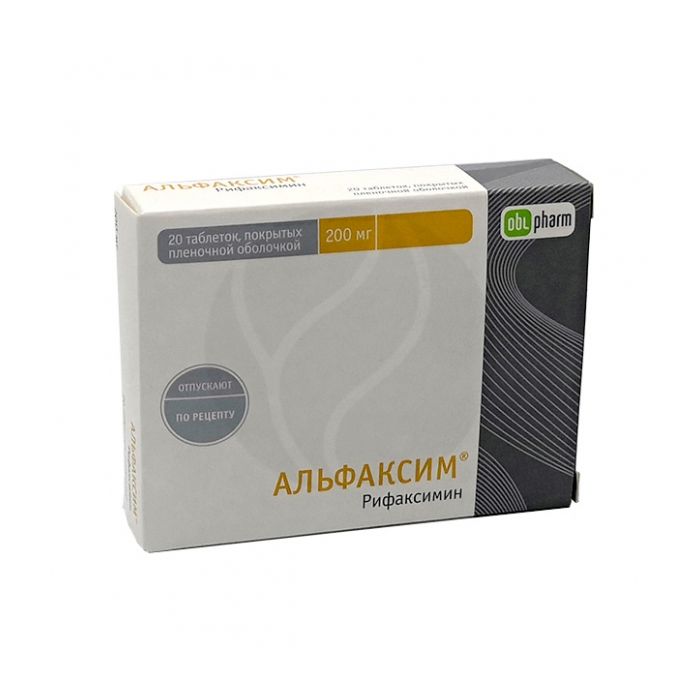Alfaxim tablets 200mg, No. 20
Expiration Date: 05/2027
Russian Pharmacy name:
Альфаксим таблетки 200мг, №20
Treatment of gastrointestinal tract infections caused by bacteria sensitive to rifaximin, incl. with acute gastrointestinal infections;
diarrhea of ??travelers;
syndrome of overgrowth of microorganisms in the intestine;
hepatic encephalopathy;
symptomatic uncomplicated colon diverticulosis;
chronic intestinal inflammation.
Prevention of infectious complications in colorectal surgery.
Adults and children over 12 years of age are prescribed 200 mg every 8 hours or 400 mg every 8-12 hours. If necessary, the dose and frequency of administration can be changed under the supervision of a physician. The duration of treatment should not exceed 7 days and is determined by the clinical condition of the patients. A repeated course of treatment should be carried out no earlier than 20-40 days.
Brown-pink film-coated tablets, round, biconvex; in cross section, the core is orange.
1 tab.
rifaximin 200 mg
Excipients: microcrystalline cellulose type 102, colloidal silicon dioxide (aerosil) hydrophobic, sodium carboxymethyl starch (sodium starch glycolate), talc, magnesium stearate.
Hypersensitivity to rifaximin and other antibiotics of the rifamycin group.
pharmachologic effect
A broad-spectrum antibiotic, a semisynthetic derivative of SV rifamycin. Irreversibly binds the beta-subunits of the bacterial enzyme, DNA-dependent RNA polymerase, and, therefore, inhibits the synthesis of RNA and bacterial proteins. As a result of irreversible binding to the enzyme, rifaximin exhibits bactericidal properties against susceptible bacteria. Has a broad spectrum of antibacterial activity, including most gram-negative and gram-positive, aerobic and anaerobic bacteria that cause gastrointestinal infections, including traveler's diarrhea. Active against gram-negative aerobic bacteria: Salmonella spp., Shigella spp., Enteropathogenic strains of Escherichia coli, Proteus spp., Campylobacter spp., Pseudomonas spp., Yersinia spp., Enterobacter spp., Klebsiella spp., Helicobacter pylori; Helicobacter pylorigram-negative anaerobes: Bacteroides spp., including Bacteroides fragilis, Fusobacterium nucleatum; gram-positive aerobes: Streptococcus spp., Enterococcus spp., including Enterococcus fecalis, Staphylococcus spp .; gram-positive anaerobes: Clostridium spp., including Clostridium difficile and Clostridium perfrigens, Peptostreptococcus spp. Rifaximin reduces the formation of ammonia and other toxic compounds by bacteria, which, in the case of severe liver disease, accompanied by a violation of the detoxification process, are involved in the pathogenesis of hepatic encephalopathy; increased proliferation of bacteria in the syndrome of overgrowth of microorganisms in the intestine; the presence of bacteria in the colon diverticulum,which can cause inflammation in and around the diverticular sac and possibly play a key role in the development of symptoms and complications of diverticular disease; the intensity of the antigenic stimulus, which, in the presence of genetically determined defects in mucosal immunoregulation and / or in protective function, can initiate or permanently maintain chronic intestinal inflammation; the risk of infectious complications during colorectal surgery. Acts in the intestinal lumen.
Pharmacokinetics
Rifaximin is poorly absorbed when taken orally (less than 1%). In the gastrointestinal tract, very high concentrations of the antibiotic are created, which are significantly higher than the MIC for proven enteropathogenic microorganisms. It is not detected in plasma after administration in therapeutic doses (detection limit <0.5 - 2 ng / ml) or is found in very low concentrations (less than 10 ng / ml in almost all cases). Almost 100% of rifaximin taken orally is in the gastrointestinal tract, where very high concentrations are achieved (concentrations in feces of 4-8 mg / g are reached after 3 days of taking in a daily dose of 800 mg). Rifaximin is excreted in the feces. Rifaximin found in urine is no more than 0.5%.
Side effect
The drug is poorly absorbed from the gastrointestinal tract, which eliminates the risk of developing systemic adverse effects. From the digestive system: in some cases - nausea, dyspepsia, vomiting, abdominal pain / colic, which usually go away on their own without the need to change the dose or suspend therapy. Allergic reactions: rarely - urticaria.
Application during pregnancy and lactation
During pregnancy, use is possible only if absolutely necessary, with the observance of precautions and under the direct supervision of a physician. The use of the drug during breastfeeding is allowed under medical supervision.
Application in children
It is used in children over 12 years old according to the dosage regimen.
special instructions
With prolonged use of rifaximin in high doses or with damage to the intestinal mucosa, small amounts of the active substance can be absorbed into the systemic circulation and cause urine to become reddish, which is due to the reddish-orange coloration of antibiotics of the rifamycin group.

